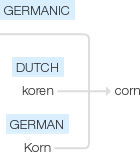Corn
Old English, of Germanic origin; related to Dutch koren and German Korn .
wiktionary
From Middle English corn, from Old English corn, from Proto-West Germanic *korn, from Proto-Germanic *kurną, from Proto-Indo-European *ǵr̥h₂nóm(“grain; worn-down”), from *ǵerh₂-(“grow old, mature”). Cognate with Dutch koren, German Low German Koorn, German Korn, Norwegian Bokmål korn, Norwegian Nynorsk korn and Swedish korn; see also Albanian grurë [1], Russian зерно́(zernó), Czech zrno, Latin grānum, Lithuanian žirnis and English grain.
In sense 'maize' a shortening from earlier Indian corn.
From Middle English corne, from Old French corn (modern French cor), from Latin cornu.
This use was first used in 1932, as corny, something appealing to country folk.
etymonline
corn (n.1)
"grain," Old English corn "single seed of a cereal plant; seeds of cereal plants generally; plants which produce corn when growing in the field," from Proto-Germanic *kurnam "small seed" (source also of Old Frisian and Old Saxon korn "grain," Middle Dutch coren, German Korn, Old Norse korn, Gothic kaurn), from PIE root *gre-no- "grain."
The sense of the Old English word was "grain with the seed still in" (as in barleycorn) rather than a particular plant. Locally understood to denote the leading crop of a district. It has been restricted to the indigenous "maize" in America (c. 1600, originally Indian corn, but the adjective was dropped), usually "wheat" in England, "oats" in Scotland and Ireland, while Korn means "rye" in parts of Germany.
Maize was introduced to China by 1550, it thrived where rice did not grow well and was a significant factor in the 18th century population boom there. Corn-starch is from 1850. Corn-silk is attested from 1852.
corn (n.2)
"hardening or thickening of skin," early 15c., corne, from Old French corne (13c.) "horn (of an animal)," later "a corn on the foot," from Latin cornu "horn of an animal," from PIE root *ker- (1) "horn; head."
Latin cornu was used of many things similar in substance or form to the horns of animals and of projecting extremities or points: It could mean "a wart, a branch of a river, a tongue of land, the end of a bow or sail-yard, the peak of a mountain, a bugle, a wing of an army," or "the stiff hair of the Germans."
corn (v.)
1550s, "to form into grains, granulate," from corn (n.1). From 1560s as "to preserve and season with grains ('corns') of salt." From 1785 (in corned) as "make drunk," as with corn whiskey. Corned beef has nothing to do with the grain; it is so called for the "corns" or "grains" of salt with which it is preserved.
